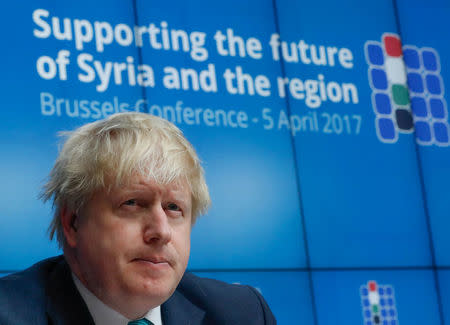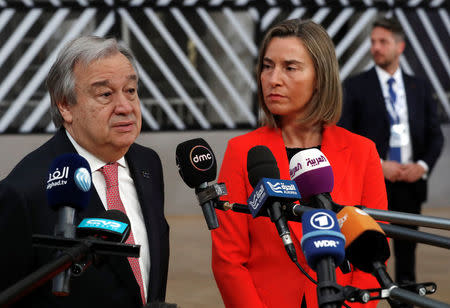Britain and France renew call for Assad to go after Syria chemical attack
By Robin Emmott and Gabriela Baczynska BRUSSELS (Reuters) - Britain and France on Wednesday renewed their call for Syria's president Bashar al-Assad to leave office, after a suspected chemical attack by Damascus killed scores of people in a rebel-held area, eclipsing an international conference to promote peace in Syria. Foreign ministers Boris Johnson of Britain and Jean-Marc Ayrault of France spoke during the conference, which raised $6 billion in immediate aid and which the European Union convened in Brussels to shore up stalled peace talks between Assad and his rivals. The money, which goes some way to meeting the U.N. appeal for $8 billion (6.41 billion pounds) for Syria this year, does not include the cost of rebuilding the country. "I simply don't see how Bashar al-Assad can remain in charge after what he has already done," Johnson said. "Of the 400,000 people who are estimated to have been killed in Syria, he is responsible for the vast majority of the butcher's bill." Ayrault said the attack was a test for the new U.S. president, Donald Trump, and his stance on Assad [nL5N1HC539]. German counterpart Sigmar Gabriel expressed frustration at the lack of clarity on Trump's position. During his election campaign and as president-elect, Trump said ousting Assad would hand control of Syria to Islamist militants. "The election campaign is over Mr. Trump," Gabriel said. U.S. intelligence officials, based on a preliminary assessment, think the deaths were most likely caused by sarin nerve gas dropped by Syrian aircraft. Trump called the attack a "terrible affront to humanity". Asked whether he was formulating a new policy towards Syria, he told reporters: "You'll see." The future of Assad, backed by Russia and Iran, has always been the main point of contention blocking progress in talks. The war has raged for more than six years, displacing millions and causing dire humanitarian conditions. "The humanitarian appeal for a single crisis has never been higher," U.N. Secretary General Antonio Guterres said. The conference, however, offered no new ideas on how to end the war, with regional power Turkey absent from the gathering and the foreign ministers of Russia and the United States skipping the event, sending lower-level officials. TRUMP LINE ON ASSAD? Though Washington, London and Paris have blamed Assad for the attack, Russia said the toxic gas had leaked from a rebel chemical weapons depot struck by Syrian bombs, revealing divisions at the Security Council. NATO head Jens Stoltenberg and EU chairman Donald Tusk on Wednesday joined the chorus condemning the attack, with the latter saying Damascus was mainly to blame but that "all who support it share moral and political responsibility". The attack came a week after Trump's Secretary of State Rex Tillerson and U.N. envoy Nikki Haley said their focus was on defeating Islamic State in Syria rather than pushing out Assad. "Under Obama, we agreed that Assad had to go, but now it is unclear where the Trump position lies," said a senior EU diplomat. "Have Washington and Moscow now agreed on backing Assad? For the EU, Assad cannot be part of Syria's future." That is a view shared by the Gulf Arab states, as presented in Brussels by Mohammed bin Abdulrahman al-Thani, foreign minister of Qatar. "There is no solution in Syria without getting rid of Assad," he said. The conference appealed for more humanitarian aid access in Syria and an end to using sieges and starvation as war tactics. Robert Mardini, who oversees operations in the Middle East for the International Committee of the Red Cross said the situation was nothing short of catastrophic in Syria. "In the seventh year of the conflict, more than a half of health facilities in the country are not running, whether because they were directly targeted or they are lacking medical supplies or personnel," he told Reuters. Of the money pledged in Brussels, most came from Europe. The European Union pledged 560 million euros (481 million pounds) from its budget for humanitarian projects in Syria, as well as supporting refugees in the neighbouring Lebanon and Jordan. Germany separately promised 1.2 billion euros (one billion pounds) extra for 2017, while London offered an additional one billion pounds. EU states and Brussels have so far mobilised about 9.5 billion euros in Syria emergency humanitarian aid. (Additional reporting by Farah Salhi, Robert-Jan Bartunek and Philip Blenkinsop in Brussels, John Irish in Paris, Writing by Gabriela Baczynska; Editing by Andrew Bolton)

 Yahoo News
Yahoo News 



